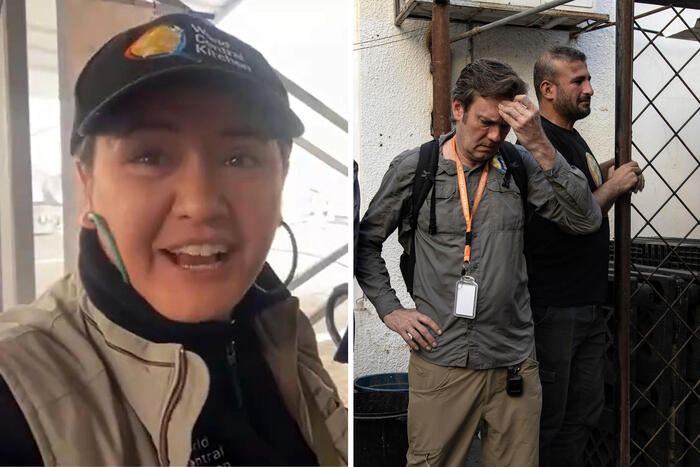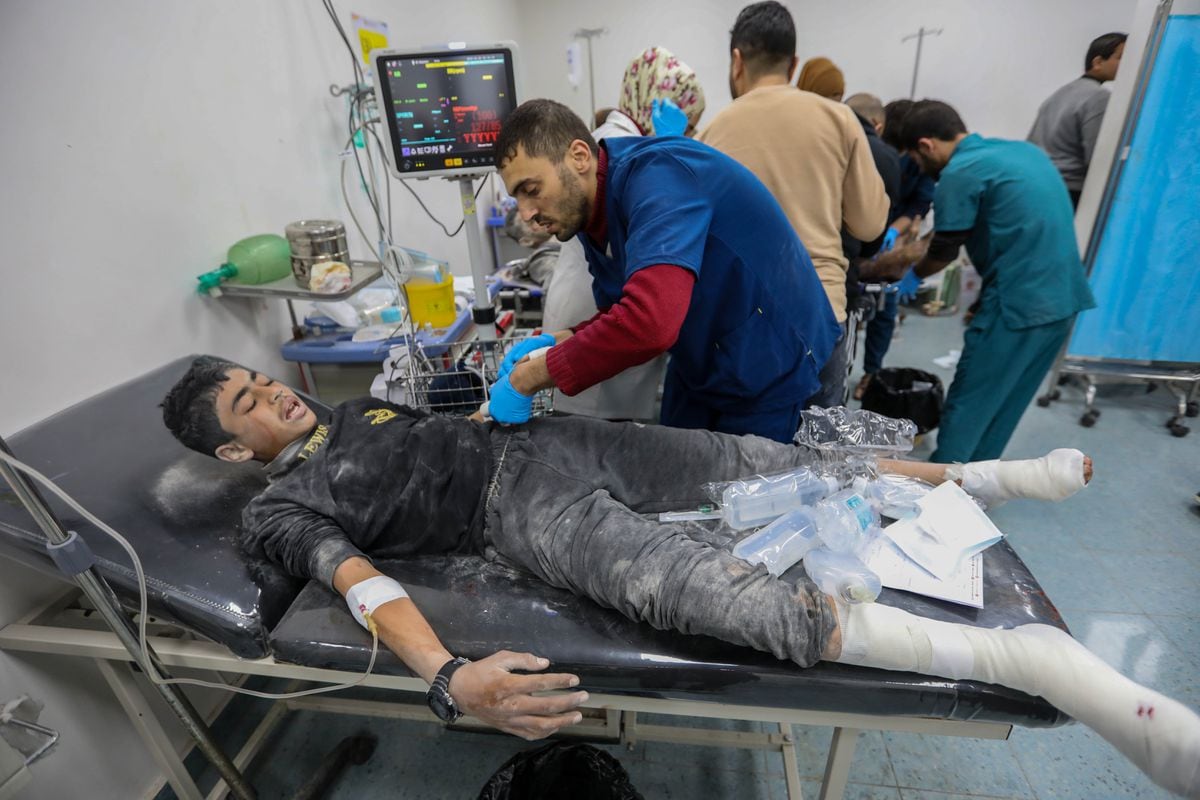Enlarge image
A Syrian Red Crescent worker carries relief supplies down a street in northern Syria
Photo: Amr Alfiky / REUTERS
More than a week after the severe earthquake in Syria and Turkey, an EU convoy with aid supplies crossed the Syrian-Turkish border for the first time.
Most of the crossings in north-west Syria are in areas not controlled by the Assad government.
The regime therefore opposed opening the borders to aid organizations for days.
Only a few days ago, it allowed deliveries to be made via additional border posts in the rebel areas.
A first UN transport with eleven vehicles reached the disaster area on Tuesday - eight days after the earthquake began.
Aid supplies from the European Union are now also reaching the region.
"Several planes from Romania have already arrived in Beirut and Gaziantep, and the first deliveries to Syria have already taken place," the EU Commission said on Friday.
Aid from twelve EU countries - less than for Turkey
Among other things, beds and emergency shelters would be delivered, it said.
A ship from Italy with family tents for the people of Syria also arrived in Beirut on Friday.
According to the information, emergency accommodation from Bulgaria and medicines from Cyprus had also previously arrived in the Lebanese port city.
Other EU aid supplies such as winter-proof tents, heaters and hygiene items are to be flown to Turkey via Dubai in the coming days and then taken to Syria.
Twelve EU countries are participating in the aid for Syria via the so-called EU civil protection procedure.
According to the Commission, Turkey has already received millions of aid supplies from 18 EU countries, including equipment for emergency accommodation, heating, medical equipment, hygiene articles and food.
WHO: Aid is being diverted in Syria
Northwest Syria is controlled by insurgents who continue to fight President Bashar al-Assad's government in Damascus.
According to the UN, more than 4,400 people were killed in the earthquake in this part of the country alone.
The Syrian government put the death toll in areas under its control at 1,414.
The World Health Organization (WHO) said it was particularly concerned about the well-being of people in the North West.
Many people there felt abandoned.
Aid shipments would almost invariably be sent to other parts of the vast disaster area.
Assad: Earthquake as "opportunity"
Syria's rulers have already admitted that the catastrophe is overtaxing their state.
"The scale of the disaster and the tasks we have to take on are far greater than the resources available," Assad said last Monday in his first televised address since the earthquake.
He thanked his "Arab brothers and friends" for the help they had provided up to that point.
The earthquake eased Assad's international isolation after more than eleven years of civil war.
First aid came mainly from Arab countries, including Saudi Arabia, which had once funded the armed opposition to Assad.
High-ranking diplomats met with him in Damascus, including Jordan's foreign minister on Wednesday.
It was the first such meeting since the beginning of the war.
The United Nations assumes that almost nine million Syrians have been affected by the quake.
They estimate the cost of humanitarian aid at around 400 million euros for the next three months alone.
The regime often already seems to benefit from it.
President Assad recently said the disaster was "an opportunity" to solve problems that had been piling up in the country.
However, aid organizations warn against opening the door to the regime again after the devastating catastrophe.
Svenja Borgschulte, spokeswoman for the German aid organization "Adopt a Revolution," which has been supporting Syrian civil society since 2011, told SPIEGEL that the earthquake did nothing to change the terror in Syria: "Syria under Assad is still a torture state that kills and oppresses its own people .«
In the past few days, emergency aid had already been organized independently of the regime.
In the meantime, more and more Syrians are traveling back to the region to help there themselves.
“The people there need our help more than ever.
However, every concession towards the Assad regime endangers additional lives instead of protecting them," Borgschulte continued.
The conflict in Syria has killed hundreds of thousands of people since 2011.
More than half of the population had to leave their homes, and millions of people have since fled abroad.
More than four million people were already dependent on aid before the earthquake in north-west Syria.
Now there are significantly more and the number could continue to rise.
Further earthquakes are feared for the coming days.
This contribution is part of the Global Society project
Expand areaWhat is the Global Society project?
Under the title »Global Society«, reporters from
Asia, Africa, Latin America and Europe
report on injustices in a globalized world, socio-political challenges and sustainable development.
The reports, analyses, photo series, videos and podcasts appear in a separate section in the foreign section of SPIEGEL.
The project is long-term and is supported by the Bill & Melinda Gates Foundation (BMGF).
A detailed FAQ with questions and answers about the project can be found here.
AreaWhat does the funding look like in concrete terms?open
The Bill & Melinda Gates Foundation (BMGF) has been supporting the project since 2019 for an initial period of three years with a total of around 2.3 million euros - around 760,000 euros per year.
In 2021, the project was extended by almost three and a half years until spring 2025 under the same conditions.
AreaIs the journalistic content independent of the foundation?open
Yes.
The editorial content is created without the influence of the Gates Foundation.
AreaDo other media also have similar projects?open
Yes.
With the support of the Gates Foundation, major European media outlets such as The Guardian and El País have set up similar sections on their news sites with Global Development and Planeta Futuro respectively.
Did SPIEGEL already have similar projects? open
In recent years, SPIEGEL has already implemented two projects with the European Journalism Center (EJC) and the support of the Bill & Melinda Gates Foundation: the "OverMorgen Expedition" on global sustainability goals and the journalistic refugee project "The New Arrivals ", within the framework of which several award-winning multimedia reports on the topics of migration and flight have been created.
Expand areaWhere can I find all publications on the Global Society?
The pieces can be found at SPIEGEL on the Global Society topic page.
jpe/dpa/Reuters





/cloudfront-eu-central-1.images.arcpublishing.com/prisa/Q7HKDQAQB5CTJK6J53RTUWRI4U.JPG)









